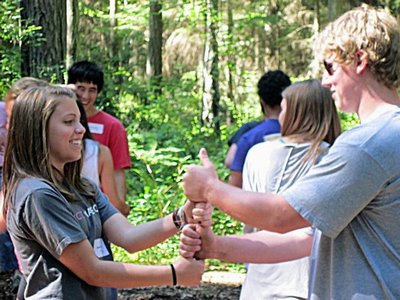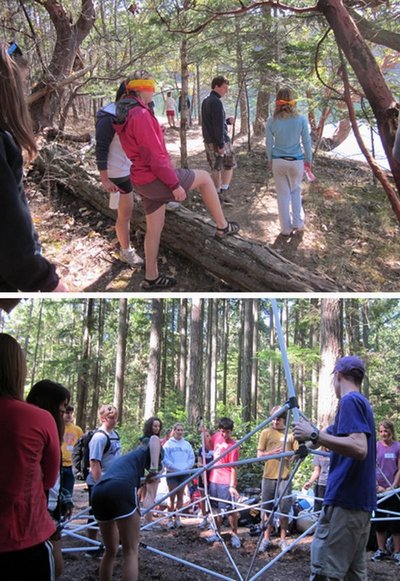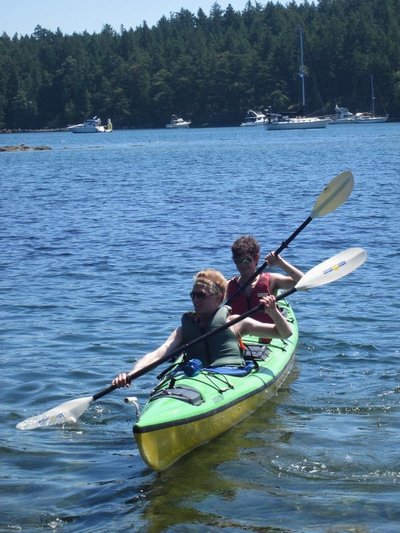July 22, 2010
More than just pre-college orientation — it’s an Outdoor Adventure
When you’re harnessed to safety ropes and walking across a log dozens of feet in the air, you had better trust the folks who are spotting you from below.
Thankfully, trust and team-building exercises are right at the heart of Outdoor Adventure, a set of summer experiences offered to new UW students by First Year Programs, in addition to the standard college orientation all incoming freshmen receive.
Three different types of Outdoor Adventures are offered, said LeAnne Jones Wiles, program manager. A two-day course takes students to a rugged site on Whidbey Island for hiking and camping; a three-day version just started this year takes them to Satellite Island, an isolated spot near Orcas Island, where the students also get to kayak. And there are single-day outings called Husky Adventures, including a no-cost camp this year dedicated to service learning.
In both overnight camps, the young participants must organize themselves enough to build their own shelter from provided materials and cook their own meals. Both also offer ropes challenge activities — low and up to 30 feet high — that require a combination of teamwork and nerve. The campsites have no running water or electricity.
Outdoor Adventure is one of several advising and orientation paths incoming UW students can take. First Year Programs also offers sessions focused on the arts, business, engineering and social sciences, plus others for honors students.
“We want them to think beyond the borders of the University District,” said Wiles. “We show them the U-District a lot, but this is a chance to see the rest of Seattle and the Northwest and to get excited about attending school.”
These outings all begin at the teenager-unfriendly hour of 7:30 a.m., so the adult and student leaders come equipped with conversational ice-breakers to get the participants in the spirit of things. “They don’t know each other, they don’t have a lot in common — they’re a little quiet,” said Wiles.
Kaitlyn Taylor, a graduate student who worked on her first Whidbey camp this month said, “We had to play a lot of get-to-know-you games in the van to get folks talking to each other. We had to hike about 10 minutes into the site, so as we walked through the woods we started pretty much immediately playing different kinds of tag and name games.”
Taylor said, “I think it was pretty interesting the way the camp was set up. The facilitators were intentional about trying to make all the decisions consensus-based.” This included what to eat, where and how to set up camp, and even when to wake up in the morning. “As the weekend went on, they needed less and less guidance,” she said.
Jamie Milligan, a student from Spokane who attended one of the two-day Whidbey Outdoor Adventures, pronounced it “awesome” and said it did indeed increase her excitement for the year to come. “And having 30 faces you already know really helped going into the orientation the next couple of days.”
Milligan said the ropes activities were challenging, but not too scary, since she has little fear of heights. “It was more fun. The goal was to get to the other side and get down safely.” She would have been safe anyhow, because she was tethered by pulleys to teammates who would not let her fall. In fact, that came in the form of a shouted promise.
“Before you started, you had to turn to the group and say something like, ‘Can I trust this group?'” Milligan said. The others called out in unison that yes, they can be trusted, and up she went.
Alison Sienkiewicz, an incoming freshman from Rockport, Mass., who also was on Whidbey, said a few were anxious about the rope challenges, but most made it through the course. “We really cheered them on, and then of course they felt great when they got to the other side.”
Participants paired up for a number of trust exercises such as being blindfolded and relying on the other for navigational help. They even created secret handshakes only the two knew. “It was silly stuff,” Sienkiewicz said, “but silly stuff that really helped us get through to each other and break the ice.”
Taylor, new to helping supervise Outdoor Adventure, was impressed by how smoothly it ran. “I was pretty surprised there was no drama — when you get a large group together there can be disagreements — but everyone was really glad to be there and really took advantage of the opportunity.”
Wiles said Outdoor Adventures have four basic goals in mind for the student participants. Through these outings they will:
- be exposed to an outdoor element in the Pacific Northwest.
- connect with a small group of new students.
- begin the transition from high school to college.
- feel connected to the UW and learn about resources that will assist with their transition.
Outdoor Adventure also reserves a few spots for student participants in the Educational Opportunity Program, administered through the Office of Minority Affairs. Students with disabilities are welcomed, Wiles said. “We make accommodations for anyone who wants to go. If a student’s in a wheelchair, we will figure it out.”
The camps are co-administered by Synergo, a Portland-based group that runs challenge courses and team-building exercises for students, teachers, athletes and business groups. Husky Adventures, also offered by First Year Programs, are low-cost, four- to eight-hour day trips that are held in September.
Taylor was pleased that the students were sincere in their engagement with the camp. “They really want to be at the UW and take full advantage of the experience they’re going to have in the next four years, and they are starting out really strong.”
Perhaps best of all, Outdoor Adventure staff say, participants tend to leave for the trips as strangers but come back bonded as friends. What else is camp for?
“I’d recommend it to anyone,” Sienkiewicz said. “It was a great experience and a great way to meet people.”



